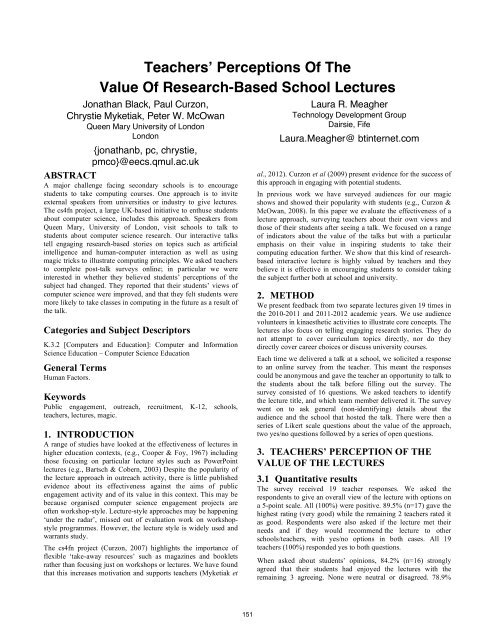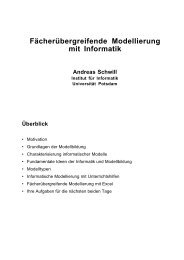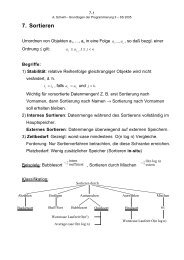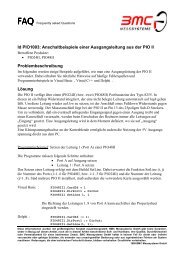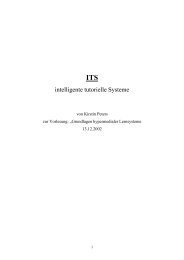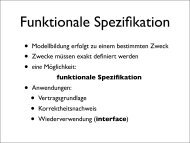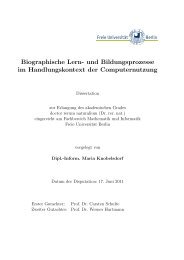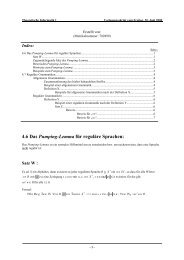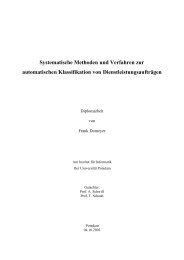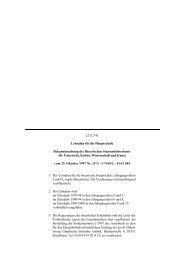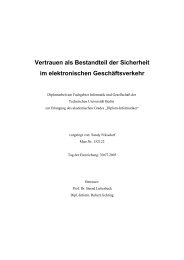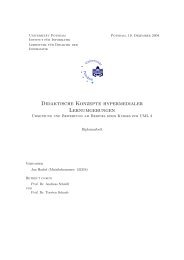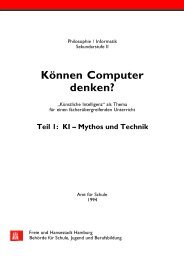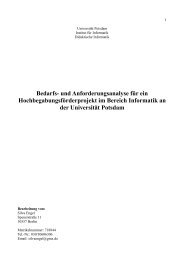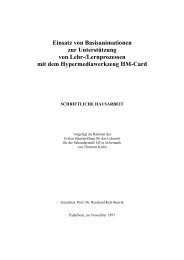Maria Knobelsdorf, University of Dortmund, Germany - Didaktik der ...
Maria Knobelsdorf, University of Dortmund, Germany - Didaktik der ...
Maria Knobelsdorf, University of Dortmund, Germany - Didaktik der ...
You also want an ePaper? Increase the reach of your titles
YUMPU automatically turns print PDFs into web optimized ePapers that Google loves.
Teachersʼ Perceptions Of The<br />
Value Of Research-Based School Lectures<br />
Jonathan Black, Paul Curzon,<br />
Chrystie Myketiak, Peter W. McOwan<br />
Queen Mary <strong>University</strong> <strong>of</strong> London<br />
London<br />
{jonathanb, pc, chrystie,<br />
pmco}@eecs.qmul.ac.uk<br />
ABSTRACT<br />
A major challenge facing secondary schools is to encourage<br />
students to take computing courses. One approach is to invite<br />
external speakers from universities or industry to give lectures.<br />
The cs4fn project, a large UK-based initiative to enthuse students<br />
about computer science, includes this approach. Speakers from<br />
Queen Mary, <strong>University</strong> <strong>of</strong> London, visit schools to talk to<br />
students about computer science research. Our interactive talks<br />
tell engaging research-based stories on topics such as artificial<br />
intelligence and human-computer interaction as well as using<br />
magic tricks to illustrate computing principles. We asked teachers<br />
to complete post-talk surveys online; in particular we were<br />
interested in whether they believed students’ perceptions <strong>of</strong> the<br />
subject had changed. They reported that their students’ views <strong>of</strong><br />
computer science were improved, and that they felt students were<br />
more likely to take classes in computing in the future as a result <strong>of</strong><br />
the talk.<br />
Categories and Subject Descriptors<br />
K.3.2 [Computers and Education]: Computer and Information<br />
Science Education – Computer Science Education<br />
General Terms<br />
Human Factors.<br />
Keywords<br />
Public engagement, outreach, recruitment, K-12, schools,<br />
teachers, lectures, magic.<br />
1. INTRODUCTION<br />
A range <strong>of</strong> studies have looked at the effectiveness <strong>of</strong> lectures in<br />
higher education contexts, (e.g., Cooper & Foy, 1967) including<br />
those focusing on particular lecture styles such as PowerPoint<br />
lectures (e.g., Bartsch & Cobern, 2003) Despite the popularity <strong>of</strong><br />
the lecture approach in outreach activity, there is little published<br />
evidence about its effectiveness against the aims <strong>of</strong> public<br />
engagement activity and <strong>of</strong> its value in this context. This may be<br />
because organised computer science engagement projects are<br />
<strong>of</strong>ten workshop-style. Lecture-style approaches may be happening<br />
‘un<strong>der</strong> the radar’, missed out <strong>of</strong> evaluation work on workshopstyle<br />
programmes. However, the lecture style is widely used and<br />
warrants study.<br />
The cs4fn project (Curzon, 2007) highlights the importance <strong>of</strong><br />
flexible ‘take-away resources’ such as magazines and booklets<br />
rather than focusing just on workshops or lectures. We have found<br />
that this increases motivation and supports teachers (Myketiak et<br />
151<br />
Laura R. Meagher<br />
Technology Development Group<br />
Dairsie, Fife<br />
Laura.Meagher@ btinternet.com<br />
al., 2012). Curzon et al (2009) present evidence for the success <strong>of</strong><br />
this approach in engaging with potential students.<br />
In previous work we have surveyed audiences for our magic<br />
shows and showed their popularity with students (e.g., Curzon &<br />
McOwan, 2008). In this paper we evaluate the effectiveness <strong>of</strong> a<br />
lecture approach, surveying teachers about their own views and<br />
those <strong>of</strong> their students after seeing a talk. We focused on a range<br />
<strong>of</strong> indicators about the value <strong>of</strong> the talks but with a particular<br />
emphasis on their value in inspiring students to take their<br />
computing education further. We show that this kind <strong>of</strong> researchbased<br />
interactive lecture is highly valued by teachers and they<br />
believe it is effective in encouraging students to consi<strong>der</strong> taking<br />
the subject further both at school and university.<br />
2. METHOD<br />
We present feedback from two separate lectures given 19 times in<br />
the 2010-2011 and 2011-2012 academic years. We use audience<br />
volunteers in kinaesthetic activities to illustrate core concepts. The<br />
lectures also focus on telling engaging research stories. They do<br />
not attempt to cover curriculum topics directly, nor do they<br />
directly cover career choices or discuss university courses.<br />
Each time we delivered a talk at a school, we solicited a response<br />
to an online survey from the teacher. This meant the responses<br />
could be anonymous and gave the teacher an opportunity to talk to<br />
the students about the talk before filling out the survey. The<br />
survey consisted <strong>of</strong> 16 questions. We asked teachers to identify<br />
the lecture title, and which team member delivered it. The survey<br />
went on to ask general (non-identifying) details about the<br />
audience and the school that hosted the talk. There were then a<br />
series <strong>of</strong> Likert scale questions about the value <strong>of</strong> the approach,<br />
two yes/no questions followed by a series <strong>of</strong> open questions.<br />
3. TEACHERS’ PERCEPTION OF THE<br />
VALUE OF THE LECTURES<br />
3.1 Quantitative results<br />
The survey received 19 teacher responses. We asked the<br />
respondents to give an overall view <strong>of</strong> the lecture with options on<br />
a 5-point scale. All (100%) were positive. 89.5% (n=17) gave the<br />
highest rating (very good) while the remaining 2 teachers rated it<br />
as good. Respondents were also asked if the lecture met their<br />
needs and if they would recommend the lecture to other<br />
schools/teachers, with yes/no options in both cases. All 19<br />
teachers (100%) responded yes to both questions.<br />
When asked about students’ opinions, 84.2% (n=16) strongly<br />
agreed that their students had enjoyed the lectures with the<br />
remaining 3 agreeing. None were neutral or disagreed. 78.9%


